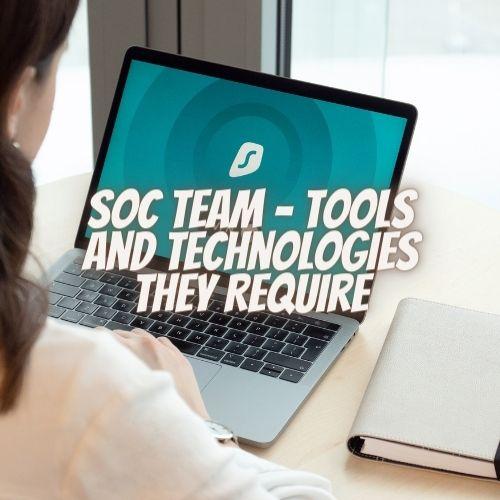When establishing a SOC team, you must ensure that you have the necessary tools and technology to assist your security team in protecting your firm. Fortunately, there are several tools available to assist you in this endeavor. SIEM (security information and event management) systems, AlienVault Incident Responder, and Exabeam Incident Responder are among the technologies available.

AlienVault SOC team
The AlienVault SOC team’s tools and technology stack automate asset inventorying and threat detection. You may also utilize the USM platform to establish custom asset groupings and execute vulnerability scans and reports on demand. These technologies enable on-premises as well as cloud scanning.
SIEM (security information and event management) is at the heart of SOC. It collects logs from throughout the organization’s network and delivers a plethora of information. This log data analysis is crucial for spotting suspicious activities. A SIEM platform can analyze and categorize log data from disparate sources and then generate alerts based on these patterns.
The tools and technology suite used by the AlienVault SOC team enable real-time insight into threats and vulnerabilities. Authenticated scans thoroughly explore assets in search of weak processes, services, and software packages. The program also makes use of custom-built cloud sensors to communicate directly with providers. It can also automatically do network vulnerability evaluations.
AlienVault USM combines vulnerability assessment and asset identification techniques to identify and notify users of environmental flaws. It integrates vulnerability scan results with asset data, allowing teams to prioritize vulnerabilities and assets depending on risk severity. File integrity monitoring (FIM) capabilities are also included in the AlienVault USM platform to monitor file integrity.
AlienVault USM helps with GDPR preparation and identifies data breaches. It also provides monitoring and documentation for data security. AlienVault USM centralizes critical functions such as network discovery, vulnerability scanning, intrusion detection, and log management. The USM also allows behavioral tracking, which aids in the detection of unusual behavior.
A SOC team must be equipped with a diverse set of tools to assist defend the network. They must constantly utilize the technologies to detect and react to emerging dangers. They must also have a thorough awareness of current and prospective dangers.
Exabeam Incident Responder
Exabeam Incident Responder is a security incident response solution that works in tandem with other SOC team tools and technologies to react to security problems completely. Its one-of-a-kind approach to security case management automates SOC while also delivering excellent threat hunting. It provides centralized orchestration and security case management, as well as integration with over 30 cloud services to provide unparalleled security.
The Exabeam Incident Responder automates the detection, response, and resolution of security events. Its distinctive feature set includes behavioral analytics, which enables SOC teams to swiftly detect fraudulent or compromised individuals. The program may suspend user accounts, processes, and network access automatically. Furthermore, it can gather data and logs.
To deliver real-time insight, next-generation SIEMs combine sophisticated behavioral analytics, machine learning, and security automation capabilities. Advanced SIEMs enables SOC analysts to respond to cyber threats more quickly and avoid alert fatigue. Furthermore, next-generation SIEMs can identify events that current security solutions cannot.
SOC team tools and technologies are getting increasingly automated, but selecting the proper ones is critical. SOCs often use 20 or more technologies. Monitoring and controlling all of these instruments individually may be difficult; thus a strong SIEM system can act as the core source of security information.
Practical SOC team tools enable incident response procedures and are intended to assist the SOC IT team in centralizing information, performing quick analysis, and assisting in-depth investigations. They also assist SOC teams in meeting their reporting obligations.
SIEM
SIEM tools are core technology that allows SOC teams to detect and prevent cyberattacks. These technologies provide real-time monitoring of network, database, and system activities. They may also incorporate threat intelligence feeds that offer information on common indications of compromise. This data may be used with log data to notify a SOC team of possible risks.
The disadvantage of employing SIEM tools is that these systems might be expensive. Furthermore, many businesses acquire several security systems to monitor diverse security risks. However, these disjointed systems may lack the complexity needed to detect threats. As a consequence, the IT staff may respond slowly. Choose a security platform that interacts with personnel and network operations to prevent this.
SIEM solutions collect and analyze event data from network infrastructure, devices, and applications across boundaries and end users. SIEMs then enable teams to evaluate this data and detect potentially risky actions. This gives a consolidated view of data and assists firms in meeting compliance reporting needs. SIEM technology also assists businesses in identifying insider threat activities by recording poor employee behavior.
SIEM software is sophisticated and must be configured by a professional. The right setup may help security teams react to intrusions more quickly. In addition, the correct SIEM software may automate repetitive operations and detect irregularities. This conserves both time and money. Furthermore, managed SIEM companies may simply and fast scale up their services.
Security Operations Centers monitor and manage information security throughout the enterprise using a variety of procedures and methods. They also use automated technologies to detect cyber risks, prioritize threats, and react to security events. Network monitoring, which allows you to examine the activities of network assets, is one tool that might assist you with the process. Threat detection and intelligence are two more technologies.
Exabeam
Exabeam is designed for the scattered world and the ever-changing needs of security teams. Exabeam gives security teams a uniform, all-encompassing picture of all security issues. Its tools and technologies are intended to decrease false positives and alert fatigue while enabling analysts to prioritize and concentrate on key situations.
The SIEM platform from Exabeam combines enterprise-scale logging and search with advanced security analytics. It also automates and centrally orchestrates security incident response. Threat information, analytics, and rules are also included in the SIEM to assist users in identifying and managing risks.
Developing thorough incident response strategies is a crucial component of SOC management. Detailed planning allows teams to react to assaults swiftly and effectively. A successful SOC team should have clearly defined duties and follow a well-defined methodology. A security analyst, an engineer, and a team manager with experience in security, management, and crisis management should be on the team.
Effective technology is required for SOC capabilities. Effective technology assists security professionals in detecting and mitigating risks more quickly by automating operations and reducing the load of alert filtering. It also frees up time for teams to focus on genuine security events. The 2020 State of the SOC report from Exabeam rated security teams based on these goals.
Exabeam SOAR software collects threat data from industry leaders and open-source databases and associates it with individual occurrences. It also automates incident response and coordinates all incident response components. It also assists businesses in centralizing assessment of SOC activities, with analyst-level and SOC manager reports displaying activity by analyst or team, as well as the progress of responding to certain phases of incident response.
CrowdStrike
CrowdStrike’s cloud-native, the single-agent design allows SOC teams to be more nimble and responsive. Customers may use RTR’s platform to deploy automated playbooks created by partners such as Vulcan Cyber and Tines. These solutions use the Falcon platform to provide real-time alerts based on certain events and situations. Users may also choose email or Slack integration to get these alerts.
SOC teams must employ solutions that expedite their job and reduce alert overload as the threat environment gets more complicated. CrowdStrike is a tool designed specifically for this purpose. They automate incident response by combining powerful endpoint telemetry with simple workflow capabilities.
CrowdStrike’s Falcon can also automate repetitive processes to boost efficiency. The software also streamlines the investigative process and simplifies team assignments. For example, it enables analysts to see individual detections as part of a single event, allowing them to react more quickly. With these solutions, security teams can successfully safeguard their business-critical assets from fast-moving attacks.
The Threat Graph database from CrowdStrike may give businesses a complete perspective of risks. It uses data from millions of sensors across the globe to contextualize threats and assaults. It also adds professional cyber security specialists to client teams that work around the clock to prevent intrusions. Its Falcon platform is cloud-native in design and can be installed in minutes.
The post SOC Team – Tools and Technologies They Require appeared first on https://kb5b.net
The post SOC Team – Tools and Technologies They Require appeared first on https://gqcentral.co.uk










Comments are closed